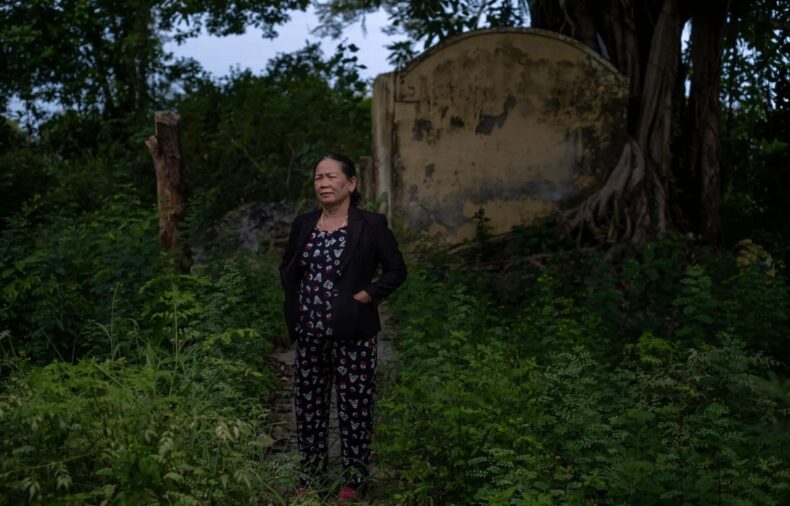For the first time in history, a South Korean court ruled that the ROK government should compensate for the damages inflicted by the Korean army on Vietnamese citizens during the Vietnam War in 1968.
On Jan. 7, Chief Judge Park Jin-Su of the Civil Division of the Seoul District Court ruled in favor of the plaintiffs in a lawsuit filed by 62-year-old Vietnamese citizen Nguyen Thí Thanh, holding South Korean govt. accountable. All of the 30 million won ($23,800) compensation claimed by the plaintiff were admitted, and only part of the delay damages was dismissed.
According to Thanh’s attorney, Lim Jae-Sung, the court also dismissed the government’s claim that civilian deaths were inevitable because the Korean troops were battling Viet Cong guerrillas who often camouflaged themselves as locals.
Nguyen filed a lawsuit in 2020, alleging that soldiers of the 2nd Marine Infantry Division (Blue Dragon Unit) of the ROK Army massacred 70 people—including her father, mother, sister, and brother, who were mercilessly shot dead. The ruthless killing spree happened in Phong Nhi village, Dien Ban, Quang Nam Province, Vietnam, on February 12, 1968, during the Vietnam War.
Justice Served for the Rightful Victims

Based on testimony from Vietnam War veterans such as Ryu Jin-Seong, a member of the marine unit linked to the attacks in Phong Nhi and Phong Nhut, village militiamen, and other evidence, the court found most of Mr. Nguyen’s claims are true. Ryu gave a first-hand account of how the Korean soldiers shot at unarmed civilians, many of them being children and women.
“At that time, soldiers of the 2nd Marine Brigade of South Korea reached the plaintiff’s home, threatened him with live ammunition and guns, forced the plaintiff’s family to come outside, and then opened fire,” the court said in its verdict, adding, “It is admitted that the plaintiff’s family died at the scene and the plaintiff and others suffered serious injuries.”
“It can also be admitted that the plaintiff’s mother was rounded up with others by the soldiers and then shot and killed her on spot,” he said, adding, “This clearly amounts to an illegal act.”
Vietnam War Atrocities– “S. Korea Must Come Clean“

“I stepped forward to testify in court because nobody else would tell the truth,” Mr. Ryu said during an online forum last month. “South Korea must come clean on its past,” she added, insinuating the present context where the South Korean and Vietnamese Govt are derailing from the issues concerning war atrocities– discussing other commercial matters at hand to strengthen their economic ties.
Meanwhile, the ROK Government argued that Vietnamese citizens could not file a lawsuit in a Korean court, that it was a legitimate act due to the nature of the war, the focus stressed upon guerrilla warfare between Viet Cong and South Korean marines. Moreover, the statute of limitations was completed, considering that the incident took place 55 years ago.
However, the court did not accept the statute of limitations, that it could not be recognized because the ROK Army had killed civilians during the war, and the government had not made efforts to determine the intensity of the damage.
Hence, the court ruled that a 1965 agreement between Seoul and the South Vietnamese government, which the govt. argued shielded its troops from legal responsibility and did not bar certain Vietnamese victims from pursuing compensation.

Mr. Nguyen, who awaited the outcome of the trial in Vietnam, said in a video call with her legal team shortly after the order came out, “I think it will be a comfort for the seventy souls who were killed in the incident.”
The delegation added significance to the sentence, saying it was “the first time an official organization of the Republic of Korea has acknowledged the massacre of civilians in the Vietnam War,” adding, “We believe that the South Korean judicial body has officially sent letters of condolence and apology to the victims.”
“So far, in criminal cases (overseas), the only punishment for individual deviance has been recognized,” he said, emphasizing that “the meaning is different from the existing criminal justice because it is recognized that soldiers massacred civilians en masse in the course of their operations.”
“Today’s ruling bears significance that the South Korean court acknowledges for the first time that there was an illegal act committed during the Vietnam War and that the South Korean government should be held legally accountable,” Thanh’s attorney Lim Jae-Sung expressed his contentment.













